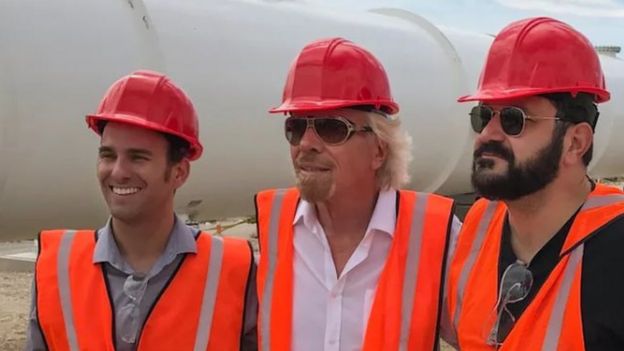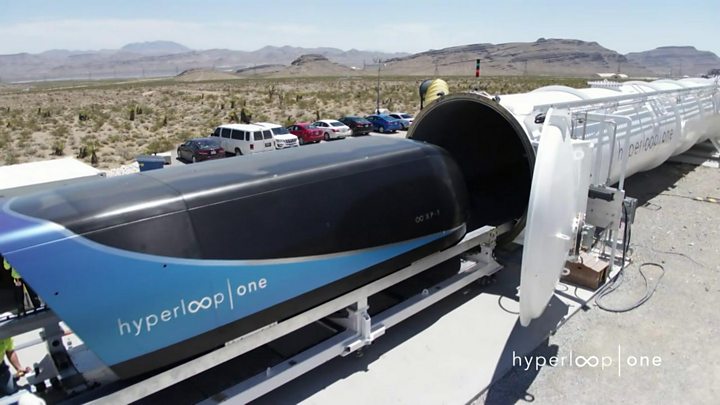
Audio By Carbonatix
The Virgin investment group has taken an undisclosed stake in Hyperloop One, one of several companies trying to create a pod-based transport system.
The terms of the deal have not been disclosed.
Virgin's founder, Sir Richard Branson, is joining the Los Angeles-based firm's board as part of the deal, and it is rebranding itself as Virgin Hyperloop One.
One expert suggested the tie-up would help raise the company's profile.
"This is unproven technology and there's a long way to go before it ever finds itself in use in the real world," commented Prof David Bailey from Aston Business School.
"But this deal will certainly help in terms of marketing and potentially attract further investors to come into the operation."

Hyperloop One recently tested a prototype pod in the Nevada desert, which reached a speed of 310km/h (192mph) within a 500m (1,600ft) low air-pressured tube.
Its eventual goal is to reach 1,046km/h (650mph).
The system uses magnetic levitation and electric propulsion to cause pods to glide, and is pitched as a more eco-friendly mode of transportation than many of today's alternatives.
The firm says it is working on several projects to bring the technology to the Middle East, Europe, India, Canada and the US.

Media captionWATCH: Hyperloop One tested a passenger-sized pod in August
In a press release, Virgin suggested the system could eventually cut journey times from Edinburgh to London to 50 minutes.
Hyperloop's inventor, Elon Musk, has previously signalled his intention to build a separate Hyperloop system via his tunnel-digging Boring Company.
Hyperloop Transportation Technologies, TransPod Hyperloop and Dinclix GroundWorks are among other companies to have announced rival projects.
'Complicated tech'
"The combination of our proven technology and Virgin's expertise in transportation, operations, safety and passenger experience will accelerate the commercialisation phase of our company's development," said Hyperloop One's co-founder Josh Giegel in a written statement.
Virgin already has investments in rail companies, cruise liners, airlines and a nascent space tourism operation.
However, Prof Bailey questioned its potential.
"I remain sceptical about using Hyperloop technology in places where there are high land values or dense population," he explained.
"But it may be more appropriate in places like the United Arab Emirates.
"It's a complicated technology and there's a long way to go."
Latest Stories
-
Divers recover bodies of seven Chinese tourists from bottom of Lake Baikal
26 minutes -
From windstorm to resilience: How Wa school is growing climate protection
1 hour -
Reclaiming the Garden City: Dr. Kwame Adinkrah urges Kumasi to rein in billboard proliferation
1 hour -
Bursar of Ghanata SHS arrested for alleged diversion of student food supplies
1 hour -
Trump says he will increase global tariffs to 15%
1 hour -
Bogoso-Prestea mine records first gold pour after 24-month shutdown
2 hours -
Ghana–ECOWAS talks end with renewed push for women and youth political inclusion
2 hours -
Interior Minister receives Hudai Foundation food donation for prison inmates during Ramadan
2 hours -
UBIDS to benefit from pre-fabricated US$6.6m 1k capacity classroom project
3 hours -
Interior Minister launches Automated Fire Safety Compliance System to enhance public safety
3 hours -
Africa must lead climate intervention conversation – Experts
3 hours -
Ghana hosts high-level ECOWAS meeting to boost women and youth political participation
4 hours -
Canada looks to trade talks after US Supreme Court tosses Trump’s tariffs
4 hours -
Ghana, Burkina Faso sign 7 cooperation agreements to deepen bilateral ties
4 hours -
Duraplast supports Accra sanitation drive with donation of 20 waste bins
4 hours

